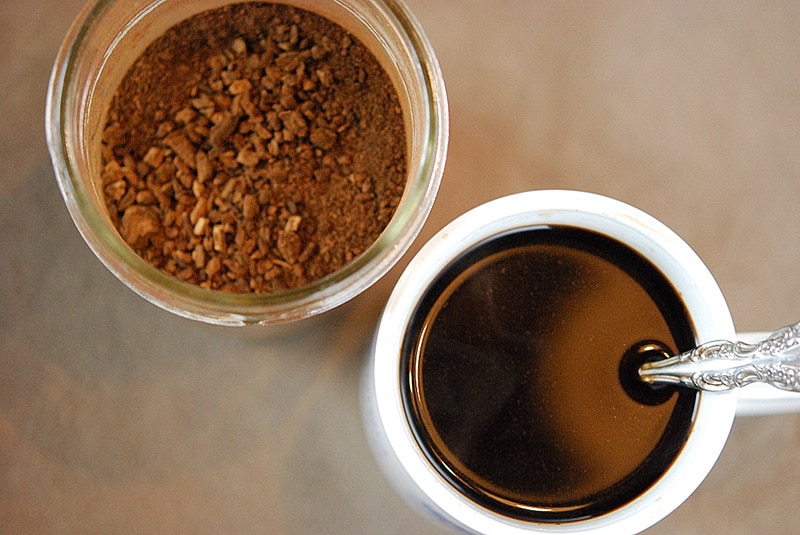Chicory coffee is tasty and fast becoming popular, but what do we know about it? Common chicory is a woody, perennial herbaceous plant that belongs to the dandelion family Asteraceae, and it usually has bright blue flowers (with rare white or pink).
The plant has many varieties that are cultivated for chicons, salad leaves, or roots, which are baked or dried, ground, and used as a food additive and coffee substitute.
- Plant Family: Asteraceae
- Scientific name: Cichorium intybus
- Order: Asterales
- Rank: Species
- Higher classification: Chicory
- Tribe: Cichorieae
How famous is Chicory coffee?
Down in the French Quarter of New Orleans, after all the late-night parties and concerts have come to an end on Bourbon Street, you’re sure to find tourists and locals unwinding at Café du Monde with the famous post-jubilee eats of the city: beignets and chicory coffee
Chicory is a naturally caffeine-free herb that is a very common coffee substitute. Because of how common it is in anew Orleans, it is also called New Orleans coffee or “chicory coffee” recipes, and it can be brewed and drunk on its own for its delicious, dark, rich flavor.
If you are looking to enjoy a coffee-like experience without buying decaf, chicory will be one of your best bet. The flavor is very similar to that of regular coffee, and because chicory coffee naturally has no caffeine content, and it appeals to a healthier and all-natural lifestyle.
Even though it has been around for more than two centuries, it was in recent times that chicory coffee had gained the most popularity yet. This hot and natural beverage tastes a lot like coffee but is made of dried or roasted chicory root rather than coffee beans.
It has now become popular among those who are trying to lessen their caffeine intake and may be connected to several health benefits, such as reduced inflammation, improved digestive health, and decreased blood sugar.
However, despite how much chicory coffee has been praised, it may also cause some adverse side effects. In this article, we’ll take a more in-depth look at the available evidence to determine whether or not chicory coffee is right for you.
Chicory coffee has a taste that is similar to that of the common coffee, but it has a flavor that is often described as slightly nutty and woody. It is either used on its own or combined with coffee as a way to complement its flavor.
Although nobody is sure of the history of chicory coffee, it is believed to have originated in France back in the 1800s during a severe shortage of coffee. Desperate for a tasty close coffee substitute, people began to mix chicory roots into their small amounts of coffee to get their desired coffee fix.
A few years later, when the Civil War broke out, chicory coffee also became popular in New Orleans as the city began to experienced a shortage of coffee after Union naval blockades cut off one of their active ports.
Today, you can still find chicory coffee in many parts of the world, and people often use it as a caffeine-free alternative to regular coffee.
Chicory root facts
- Chicory root has several useful nutrients
- Chicory root is the main ingredient in the production of chicory coffee.
- To make chicory coffee, raw chicory root has to be minced, roasted, and finally brewed into coffee.
Although it is possible for the amount to vary, it’s usually recommended to use around 2 tablespoons (that is about 11 grams) of blended chicory root for every 1 cup (235 milliliters) of water.
One raw chicory root (usually 60 grams) contains the nutrients below:
- Calories: 44
- Protein: 0.8 grams
- Carbs: 10.5 grams
- Fat: 0.1 grams
- Fiber: 0.9 grams
- Manganese: 7% of the RDI
- Vitamin B6: 7% of the RDI
- Potassium: 5% of the RDI
- Vitamin C: 5% of the RDI
- Phosphorus: 4% of the RDI
- Folate: 3% of the RDI
What are the benefits of chicory root?
Chicory root is found to be a great source of inulin because it is a type of prebiotic fiber that has been connected to improved gut health and increased weight loss.
Chicory root also contains some vitamin B6 and manganese, two nutrients that have been tied to brain health.
Keep in mind that the amounts of the nutrients mentioned above in chicory coffee are somewhat low, as only a little quantity of chicory root is brewed into the chicory coffee.
It May Improve Digestive Health
Chicory root is found to be a fantastic source of fiber, which may help to improve several aspects of a person’s digestive health.
It may help to improve the overall health of some person’s gut microbiome, which is known to have a strong influence on disease and overall health.
The reason for this is that chicory contains inulin fiber, which is a type of probiotic that helps to promote the growth of useful bacteria in the gut.
It has been revealed by several studies have shown that supplementing with inulin could incrawrease the concentration of certain strains of healthy bacteria in the colon.
Studies also revealed that chicory might help to reduce constipation and improve bowel function.
A study carried out recently had 44 people who used a constipation supplement that contained chicory inulin. It was discovered to increase the frequency and softness or stool, compared to a placebo.
In another study, it was found that consuming chicory lessened defecation difficulties among 25 participants who were elderly.
Chicory Coffee Could Lower Blood Sugar
Chicory root has been found to contain inulin, which is a type of fiber that has been discussed to help with managing blood sugar levels both in humans and in animal studies.
A recent study involved the treatment of diabetic rats with chicory inulin for two months. The study found that it helped to control blood sugar by making better the way that carbohydrates are metabolized.
Although research on the effect of chicory inulin on blood sugar is limited, many other studies have revealed that inulin may be beneficial to insulin resistance and blood sugar.
Insulin is known as the hormone that helps to transport sugar from the blood to tissues and muscles, where it can be used as fuel. High blood sugar is usually as a result of Insulin resistance, which happens with high levels of insulin over a prolonged period, and decreases the effectiveness of this hormone.
In one brief study, inulin helped to reduce insulin resistance in 40 people who had prediabetes. In another study, it was founded that supplementing with at least 10 grams of inulin daily helped to drop fasting blood sugar levels by as much as 8.5% among 49 diabetic women.
However, most researches have focused more on the effect of inulin rather than on chicory. Further research is required to determine the effect of chicory coffee itself on blood sugar.
It May Help Decrease Inflammation
Although inflammation is a healthy immune system response, chronic inflammation is thought to contribute to conditions like heart disease, diabetes, and cancer.
Some animal studies have revealed that chicory root may contain anti-inflammatory properties. In an animal study, chicory root was discovered to reduce a good number of markers of inflammation.
Another study also revealed that feeding piglets with dried chicory root helped to decrease levels of inflammation.
Nevertheless, most of the current research on chicory coffee and root is limited to animal studies. More studies are required to determine the roles that chicory roots may play in inflammation that affects humans
Chicory Coffee Is Naturally Caffeine-Free
Taking chicory coffee can be an excellent way to help reduce your intake of caffeine. Regular coffee is not caffeine-free as it is made of roasted and ground coffee beans, which is then brewed into coffee.
A typical cup of coffee contains around 95 milligrams of caffeine, even though this can vary based on several factors. These factors include the kind of coffee beans that are used, the serving size, and the type of coffee roast.
Consuming very high amounts of caffeine has been connected with side effects like insomnia, nausea, heart palpitations, anxiety, and restlessness.
Chicory roots, on the other hand, are naturally caffeine-free. This it is considered an excellent coffee substitute for people who are looking to cut down on their intake of caffeine.
Some people who do not want anything to do with regular coffee may add chicory root to warm or hot water for an entirely caffeine-free beverage. Others may mix it into a little amount of regular coffee in order to enjoy a lower-caffeine drink.
It May Not Be healthy for Everyone
While it is true that chicory coffee has been found to have several health benefits, it’s not healthy for consumption by everyone.
Some people may have an allergy reaction to chicory, causing severe symptoms such as swelling, pain, and tingling of the mouth.
Also, people who have an allergy to birch pollen or ragweed must avoid chicory to reduce adverse side effects. If you notice that you develop any negative symptoms as a result of consuming chicory coffee, you are advised to discontinue use and consult your doctor immediately.
Furthermore, pregnant women shouldn’t take chicory coffee as it has been discovered to trigger menstrual bleeding and miscarriage.
Finally, several studies on the safety of chicory coffee or chicory root for breastfeeding women is limited. Do well to check with your doctor before you consume it to avoid any adverse symptoms.
The bottom line
As mentioned earlier, chicory coffee may be connected with several health benefits and is a fantastic substitute for regular coffee if you are trying to cut down on your intake of caffeine.
However, there at present, there are limited studies on the physical effects of chicory coffee, with no evidence showing that it is any better than regular coffee.
Still, if you are fit to take it and you love the taste of chicory coffee, feel free to take it in place of coffee. Let us know your thoughts, and do well to leave questions in the comments section provided below.
References;
- Nutrition data, chicory roots raw; National library of medicine
- A Randomized Controlled Trial: The Effect of Inulin on Weight Management and Ectopic Fat in Subjects With Prediabetes; PubMed
- Effects of Chicory Inulin in Constipated Elderly People: A Double-Blind Controlled Trial; PubMed







